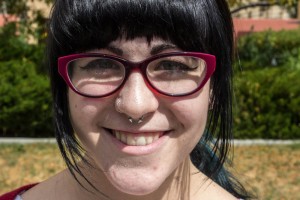Tags
Related Posts
Share This
Q/A: Reagan Roby
Reagan Roby is in her second year at SFUAD as a theater tech major. Since transitioning from musical theater, she has been involved with eight shows in only a year and a half. In the Q&A, Roby discusses the new head of PAD, fussy actors and future plans.
Jackalope Magazine: What Brought you to SFUAD?
Reagan Roby: I was in theater in high school and Kevin Klutz, one of the alums from here, persuaded me to come and visit and I just really liked it.
JM: Did you originally come here as a theater tech major?
RR: No. I actually came here as a musical theater major. I went to some classes and was like ‘I’m really bad at acting…(laughs) And then PA’d for a show and kind of fell in love with stage management after that.
JM: What do you think about Laura Fine Hawkes, the new head of the department who has a theater tech background?
RR: I think it’s really good. Last year I was really debating staying here. Just because we had a sub chair, nothing was really getting done. Our TD (Technical Director) last year was, ugh. It’s really nice to have Laura, because she is a technical theater person, graduated with that degree. She’s really making a lot of changes and making it suitable, an environment to learn, for tech majors.
JM: What productions are you working on this semester?
RR: Currently I am working Some Girls, directed by Gail Springer and I am ASMing (Assistant Stage Managing) for that. In a couple weeks, I am PSMing (Production Stage Managing) Hotline, which is directed by Hamilton Turner.
JM: What are some of your duties as a PSM?
RR: When you PSM, it’s basically your job to run rehearsals. You make all the sign-in sheets, you make sure everyone is there on time, you make sure that the set is taped out for rehearsals, you change all the rehearsal furniture, stuff like that.
JM: In your time here, have you dealt with any difficult actors on set?
RR: Yeah yeah yeah. It can be a problem. I know last year during the show that I was working on, there were some big ego-ed actors on set, which is fine. You get used to it. You just have to be like, ‘Alright, it’s not my job to be your mom, you can go get your food yourself.’ (laughs).
JM: Having a history in performance, do you think you can handle it with more empathy?
RR: I don’t think that I can handle it better than others, but I guess I have a better understanding of what someone would want backstage, as opposed to someone who hasn’t been backstage, or hasn’t been on stage and is freaking out backstage and want somebody to be like ‘it’s OK, here’s some water!’
JM: How have the shows been going this semester?
RR: The shows are going really well, it’s definitely a new experience, because we are doing theater in the round this year, and we’re used to doing it in the proscenium, facing from the stage. This time we’re actually on the stage with bleachers around everything, so instead of just working from the front, you’re working from 360 degrees. It’s definitely a lot different. It’s a close environment. It’s a really intimate theater scene, which is really nice.
JM: Are there any problems that stem from this?
RR: The only problems that I know stage management has run into…it’s not even a problem. It was just hard in the beginning with blocking. Usually, it’s just stage right, and stage left. ‘They’re at the stage at 12,’ because we do it from a clock now, basically. So it’s kind of confusing, but we’re working through it.
JM: Even though you’re only a sophomore, have you started thinking about what you will do after graduation?
RR: I don’t know if I’m going to do an internship my junior or senior year. The school offers internships in New York to go work with theaters and stuff, so I’m probably going to do that. Afterward, I might stay here for a year, then go to New York and try to make some connections. Start off small then do some bigger shows at bigger places.







 Jackalope Magazine is the student magazine of Santa Fe University of Art and Design. Building on the interdisciplinary nature of our education, we aim to showcase the talent of our university and character of our city.
Jackalope Magazine is the student magazine of Santa Fe University of Art and Design. Building on the interdisciplinary nature of our education, we aim to showcase the talent of our university and character of our city.
Recent Comments